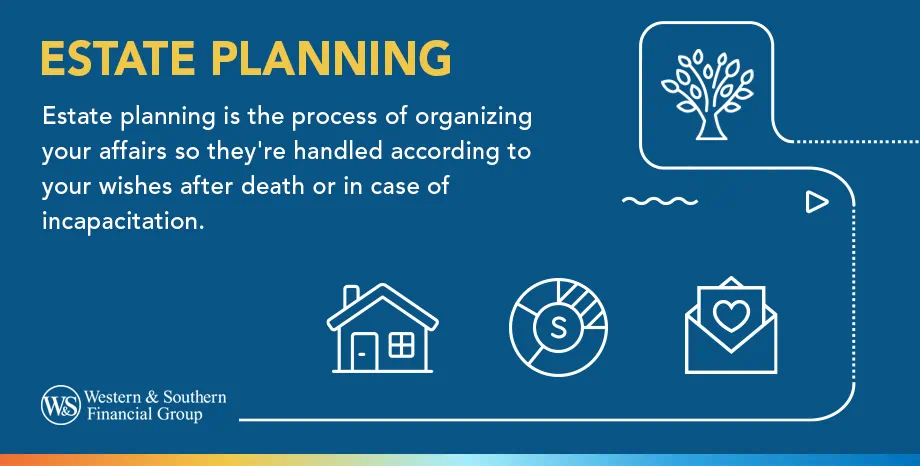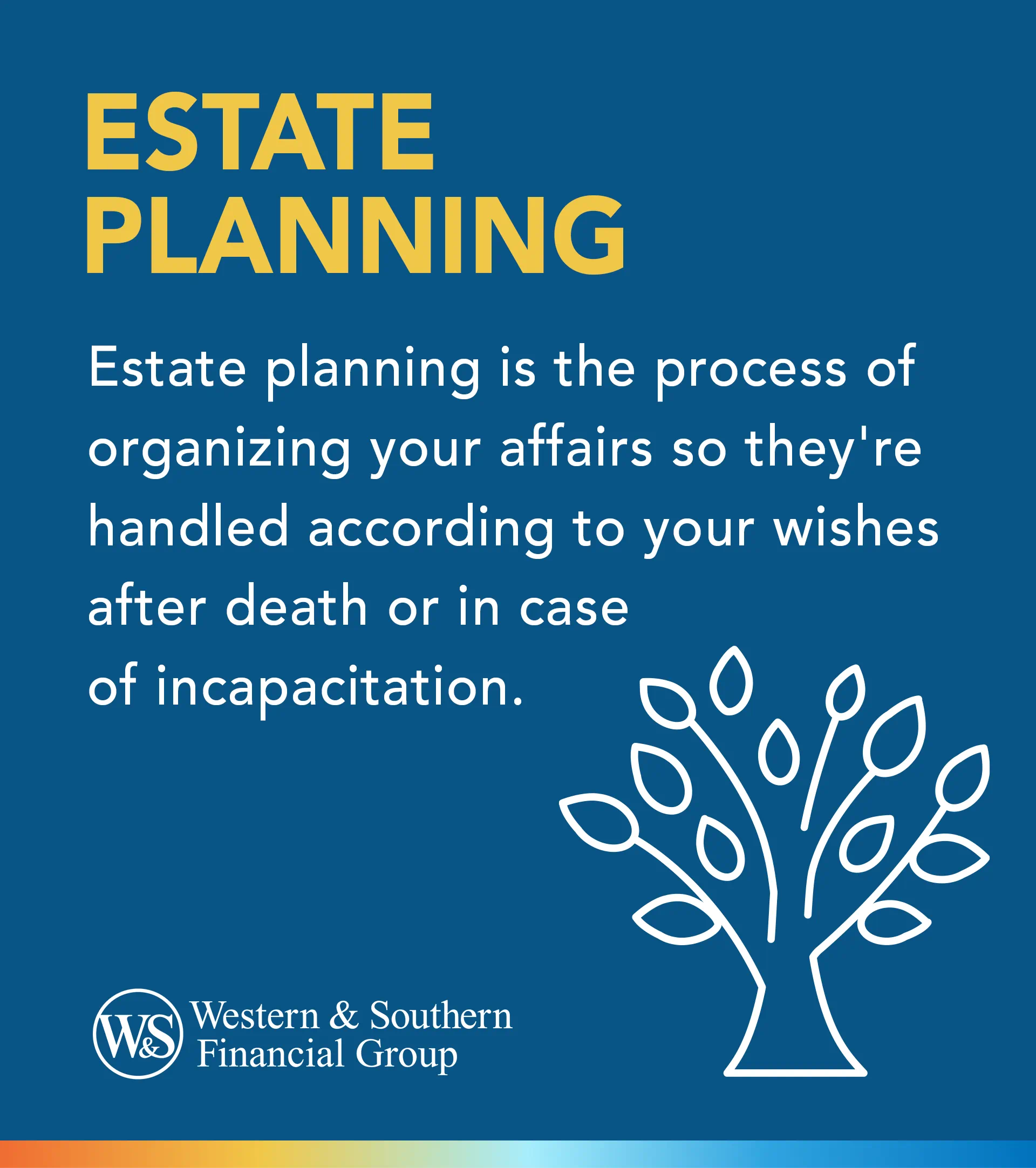

Key Takeaways
- Estate planning helps you retain control over asset distribution, reduce estate taxes, and helps protect against costly probate procedures.
- Proper estate planning helps provide for beneficiaries, avoids family disputes over inheritance, manages incapacity situations, and helps protect assets from creditors.
- In estate planning, various legal documents include the Last Will and Testament, Trusts, Power of Attorney, Living Will, etc.
- Understanding the various taxes involved in estate planning to optimize and plan the distribution of your assets.
- Working with an estate planning attorney to establish a valid estate plan is important to navigating complex legal rules.
What is Estate Planning?
Estate planning involves organizing your affairs to be handled according to your wishes after death or in case of incapacitation. Managing your finances, documenting intentions, and maintaining proper estate plan documents can enhance your chances of achieving your desired outcome.
Why is Estate Planning Important?
Estate Planning is important in helping ensure your loved ones are cared for, your wishes are honored, and your legacy is protected after passing. It's a comprehensive approach to managing your financial affairs, helping protect your wealth, and your family's future. Here's why it's so important:
Control Over Asset Distribution
Without a proper estate plan, the distribution of your assets might be controlled by state laws through a process known as probate. Estate planning allows you to dictate exactly how, when, and to whom your assets will be distributed.
Reduction of Taxes
Estate and inheritance taxes can be a substantial burden for estates with significant value. Certain estate planning strategies may reduce taxable estate amounts; consult a tax professional for details.
Avoiding Probate
The probate process can often be prolonged, expensive, and publicly accessible. Certain estate planning tools, such as trusts and beneficiary designations, may help transfer assets outside of probate, depending on state laws.
Protection for Beneficiaries
Estate planning isn't just for the wealthy; it's also for the protection of minor or incapacitated beneficiaries. Through estate planning, you can designate guardians for minor children and arrange trusts that help ensure beneficiaries who are minors or lack financial prudence are not burdened with mismanaged lump-sum inheritances.
Avoiding Family Disputes
Sadly, a death in the family can sometimes bring out the worst in people. A clear estate plan clarifies your wishes and limits the potential for family disputes over the inheritance.
Incapacity Management
What happens if you become incapacitated due to illness or injury? Without an estate plan, the courts will likely decide who takes control of your financial affairs and health care decisions. Estate planning includes creating powers of attorney and health care directives to designate who will make these decisions on your behalf.
Help Protect Assets from Creditors
If you have creditors, they may be able to claim against your estate after you die. Estate planning strategies may provide options to help limit exposure to creditors.
An estate plan helps ensure your wishes are honored and assets protected. Start Your Free Plan
What Are the Steps to Set Up an Estate Planning Strategy?
Creating a comprehensive estate plan helps ensure your assets are protected, your wishes are honored, and your loved ones are cared for in the future. While the process may seem overwhelming, breaking it down into clear, manageable steps makes it more approachable.
Each step is important to helping secure your financial legacy, from taking an inventory of your assets to designating beneficiaries, drafting legal documents, and understanding tax implications.
Here is an estate planning checklist that outlines the primary steps to build an estate plan that clarifies, minimizes legal complications, and helping protect your family’s future.
- Step 1: Take an inventory of your assets.
- Step 2: Designate your Beneficiaries.
- Step 3: Select Guardians for your minor children.
- Step 4: Take the time to understand estate tax laws
- Step 5: Draft your Last Will and Testament.
- Step 6: Establish necessary Powers of Attorney.
- Step 7: Set up any Trusts (if applicable).
- Step 8: Draft your advance Health Care Directives.
- Step 9: Store your documents properly and safely.
What Are the Key Documents for Estate Planning?
Estate planning involves several important documents that work together to help ensure your assets are managed and distributed according to your wishes upon your incapacity or death. Each document serves a unique purpose and addresses different aspects of your estate.
Here are the typical estate planning documents that are typically included in a comprehensive estate plan:
Last Will and Testament: A Will outlines how you want your estate's assets and property distributed after death. It allows you to name beneficiaries, designate guardians for minor children, and appoint an executor to manage the estate's affairs through probate.
Trust: A Trust is a flexible estate planning tool that offers control, privacy, tax benefits, and asset protection. They can effectively manage and transfer your assets according to your wishes. To choose the right trust for your estate plan, it is important to understand the different types of trusts available.
Durable Power of Attorney (Financial): This legal document gives another person (the agent) the authority to manage your financial accounts if you become incapacitated. A Power of Attorney can handle tasks like paying bills, managing investments, or selling property.
Health Care Power of Attorney: Also known as a Health Care Proxy, this document allows you to appoint someone to make health care decisions on your behalf if you cannot.
Living Will: A living will, or an advance health care directive, specifies your preferences for medical treatment, life support, and end-of-life care if you cannot communicate your wishes.
HIPAA Release: The Health Insurance Portability and Accountability Act (HIPAA) helps ensure medical privacy. A HIPAA release form allows designated individuals to access your medical records, which can be important if incapacitated.
Letter of Intent: This personal document may accompany your will. It's used to outline your wishes for things like funeral arrangements or how you'd like certain assets distributed, which may not be explicitly detailed in your will.
What Taxes Do I Need to Plan for When Estate Planning?
When engaging in estate planning, understanding the potential tax implications is important. Various taxes can impact the value of the estate you leave to your heirs, and they differ based on your location, the size of your estate, and the types of assets you own. Here are the primary taxes you need to consider when estate planning:
- Estate Taxes: These are taxes levied on the estate's value before distribution to the heirs. The government imposes a federal estate tax if your estate exceeds a certain threshold in value ($13.99 million for 2025).1 The rate and exemption can change, so staying current with these laws is important. Additionally, some states have their estate tax with varying exemption levels and rates, independent of federal taxes.
- Inheritance Taxes: Unlike estate taxes, which are taken from the estate's overall value, inheritance taxes are imposed on the individuals receiving inheritances. The rate can depend on the beneficiary's relationship to the decedent and the inheritance amount. Not all states impose an inheritance tax, so you'll need to consider the specific laws in your state or where your beneficiaries reside.
- Gift Taxes: If you plan to reduce your estate's value by gifting assets to your heirs while still alive, you must consider the gift tax. The federal government allows you to give a certain amount annually to an unlimited number of people without triggering gift taxes, but gifts exceeding that amount are taxable.2 Some states have gift tax laws like estate taxes, which you'll also need to consider.
- Income Taxes: Certain assets, like inherited retirement accounts, may be subject to income taxes when the beneficiaries withdraw funds. For non-retirement assets, beneficiaries may owe taxes on income generated by these assets, such as dividends, interest, or rent. Consider the income tax for assets held in irrevocable trusts, which may be subject to high trust income tax rates.
- Capital Gains Taxes: Beneficiaries might owe capital gains taxes if they sell inherited assets like real estate or stocks for more than their value when they inherit them. However, inherited assets usually receive a "step-up" in basis to the market value at the time of the decedent's death, which can minimize capital gains taxes.
- Generation-Skipping Transfer Taxes: If you're giving assets to grandchildren or someone at least 37.5 years younger than you, you might trigger the generation-skipping transfer tax (GSTT). This tax, in addition to the federal estate and gift taxes, is designed to prevent avoidance of those taxes through bequests to younger generations.
- Property Taxes: If real estate is part of the inherited estate, beneficiaries must plan for ongoing property taxes. Depending on the property's location, exemptions or reductions might be available for primary residences or farm properties.
- Fiduciary Income Taxes: Income accrued by the estate or a trust before assets are distributed to the beneficiaries is subject to fiduciary income taxes. The estate representative or the trustee must file the necessary tax returns.
Given the complexity and variability of tax laws, it's advisable to consult with an estate planning attorney or tax advisor to understand current laws, explore strategies for minimizing taxes, and help ensure compliance. Proper planning can help preserve the value of your estate and ease the financial burden on your heirs.
How Do I Estate Plan at Different Life Stages?
Estate planning is not a one-time endeavor but an ongoing process that evolves with major life events. Each stage of life brings different priorities and needs, which should be reflected in your estate plan. Below, we explore how estate planning strategies might change as you progress through different life stages:
Young Adulthood
- You may not have substantial assets at this stage, but estate planning is still important, especially if you have children. Naming a guardian for your children in your will is paramount.
- Establishing a durable power of attorney and a health care directive is important to designate someone to make financial or health decisions if you cannot make them yourself.
Marriage or Partnership
- Upon entering a marriage or partnership, updating your estate plan to reflect your spouse or partner is vital. This often involves updating beneficiary designations on retirement accounts and insurance policies and setting up joint ownership for various assets.
- Consider establishing a marital or family trust, and explore estate tax minimization strategies as your asset pool grows.
Middle Age
- As you acquire more assets and your family grows, creating a will or a trust to dictate asset distribution becomes important. It's also an excellent time to start planning for your children's future, perhaps by setting up education trusts.
- This stage often requires more sophisticated tax planning and might include life insurance policies to help protect your family's financial future.
Pre-Retirement
- This phase should focus on retirement planning, ensuring that your estate and retirement plans are aligned. Balancing retirement living expenses with the desire to leave an inheritance can be challenging but necessary.
- Explore long-term care insurance and medical care options for aging. Review and update your beneficiaries and trustees/executors.
Retirement
- Estate planning in retirement might focus on preserving your assets, managing retirement income, and potentially downsizing. Consider strategies to minimize taxes on asset distributions to heirs.
- This is also a time to help ensure your health care directives and power of attorney are current and consider charitable giving or legacy planning.
Senior Years
- In your senior years, estate planning might involve simplifying finances, possibly consolidating accounts, and helping ensure everything is straightforward for your heirs.
- Ensuring your will, trusts, and beneficiary designations are up-to-date is important. You might also focus on planning your funeral or memorial service and communicating your wishes to your family.
Late Life/End-of-Life
- This final stage often involves reviewing your documents to help ensure they reflect your current wishes, communicating with your family about your healthcare desires, and possibly engaging in Medicaid planning.
- During this stage, common activities include gifting assets to heirs or charities, establishing a revocable living trust to avoid probate, and helping ensure clear communication about end-of-life wishes.
How Can I Use Life Insurance in Estate Planning?
Life insurance is a pivotal component of estate planning, offering financial protection and support to your beneficiaries after death. It plays several roles and offers unique benefits in the context of estate planning:
Providing for Dependents and Survivors: Life insurance proceeds help ensure that your dependents have the financial resources they need upon your death. This is particularly important for parents with minor dependent children or adults who support spouses, aging parents, or disabled family members. The death benefit can replace lost income stream, cover living expenses, pay off debt, and help provide for your children's education, helping ensure your family maintains their standard of living.
Covering Final Expenses: Life insurance can cover funeral costs, medical bills not covered by health insurance, and other final expenses, relieving your family of financial burden during a difficult time.
Settling Debts or Other Obligations: Proceeds from a life insurance policy can be used to pay off mortgages, car loans, credit card debts, and even estate taxes, preventing the need to sell other assets to cover these debts.
Estate Taxes and Liquidity: For estates subject to estate taxes, life insurance can help provide the funds necessary to pay these taxes without liquidating assets. This is particularly important if the estate includes illiquid assets like a family business or real estate. The insurance payout can be excluded from the taxable estate by setting up an irrevocable life insurance trust (ILIT).
Equalizing Inheritances: If your estate comprises assets you'd prefer to leave to specific heirs (like a business going to a child who works in it), life insurance can compensate other heirs to help ensure equal inheritances.
Wealth Transfer and Legacy Planning: Life insurance can create a substantial financial benefit for a relatively low cost, significantly increasing the amount you can leave to heirs or charities. Policies with a cash value component, like universal or whole life, can also grow tax-deferred over time and be used for wealth transfer.
Business Succession: In a business context, life insurance is key for buy-sell agreements, helping ensure funds are available for surviving business partners to buy the company interests of a deceased partner from their estate. It can also help provide cash flow for the business during a transition period after an owner's death.
Charitable Giving: If philanthropy is important to you, a life insurance policy can enable a significant philanthropic gift upon your death by naming a charity as the policy's beneficiary or donating the policy itself.
When integrating life insurance into estate planning, consider the type of policy, the coverage amount, the policy owner, and the designated beneficiaries.
Collaborating with financial advisors, estate planners, and insurance professionals can help ensure that life insurance effectively complements your broader estate plan, aligning with your financial goals and family needs.
What Are the Common Estate Planning Mistakes to Avoid?
Estate planning is an important process that helps ensure your assets are properly managed and distributed per your wishes. However, the process can be complex, and mistakes can have long-lasting impacts on you and your beneficiaries. Here are some common estate planning mistakes to avoid:
Not Having an Estate Plan: Without one, the state can determine how your assets are distributed, potentially leading to long, costly legal battles for your heirs.
Failing to Update Your Will or Trust: Life changes such as marriage, divorce, birth of children, or the death of a beneficiary should prompt a review of your estate plan. An outdated plan can cause unintended consequences, such as assets going to an ex-spouse or new family members being left out.
Ignoring Beneficiary Designations: People often forget that assets like life insurance policies and retirement accounts are governed by beneficiary designations rather than the will. Failure to keep these designations up-to-date can result in the wrong people inheriting these assets.
Underestimating the Power of Trusts: Trusts aren't just for the wealthy. They offer privacy, help avoid probate, and can help protect beneficiaries from their own bad decisions or creditor problems. Failing to consider a trust is a common mistake.
Not Planning for Disability: Many people associate estate planning with death, but it's also important to plan for incapacity. Establishing powers of attorney for health care and finances helps ensure that your wishes are adhered to if you cannot make decisions for yourself.
Overlooking Estate Taxes: While not everyone will owe federal estate taxes, those with sizable estates may. Others may owe state estate taxes or inheritance taxes. Not planning for these can take a significant bite out of your legacy.
Failing to Consider the Impact on Public Benefits: Leaving assets to a beneficiary receiving public benefits, such as a disabled child, can disqualify them from receiving those benefits. A special needs trust can avoid this problem.
Assuming a Will Prevents Probate: A will is the document used in the probate process. It doesn't avoid probate. Assets can only avoid probate through beneficiary designations, joint ownerships, or trusts.
Not Seeking Professional Advice: Estate planning laws can be complex and vary by state. Professional advisors can help navigate these complexities and avoid common pitfalls, helping ensure your wishes are carried out effectively.
Not Communicating Your Estate Plan: Failure to discuss your estate plan with your family can lead to disputes or surprises after your death. Communicating your wishes can clarify, reduce conflict, and help ensure everyone is on the same page.
By recognizing and avoiding these common mistakes, you can help ensure that your estate plan accurately reflects your wishes, helps protect your assets, and provides for your loved ones. Consider consulting with a financial advisor or estate planning attorney to guide you through this process.
Why Work with an Estate Planning Attorney?
Working with an estate planning attorney to establish a valid estate plan is important to navigate the complex legal rules surrounding estate planning, helping ensure your assets are distributed according to your wishes while minimizing taxes and avoiding potential legal pitfalls.
They help provide customized strategies that account for your unique family needs, financial situation, and future objectives. Their expertise is important in updating your plan in response to life changes and law modifications, preventing family disputes, and helping ensure the continued protection of your estate and beneficiaries.
Conclusion
Don't leave your future to chance. Get started on your estate planning journey today! It's never too early to help ensure protection of your financial assets and the welfare of your loved ones. After all, the comfort that comes from knowing you've done all you can to help protect your family and legacy is invaluable. Don't delay. Start your estate planning today!
An estate plan helps ensure your wishes are honored and assets protected. Start Your Free Plan
Sources
- Frequently asked questions on estate taxes. https://www.irs.gov/businesses/small-businesses-self-employed/frequently-asked-questions-on-estate-taxes.
- Frequently asked questions on gift taxes.https://www.irs.gov/businesses/small-businesses-self-employed/frequently-asked-questions-on-gift-taxes.





































































